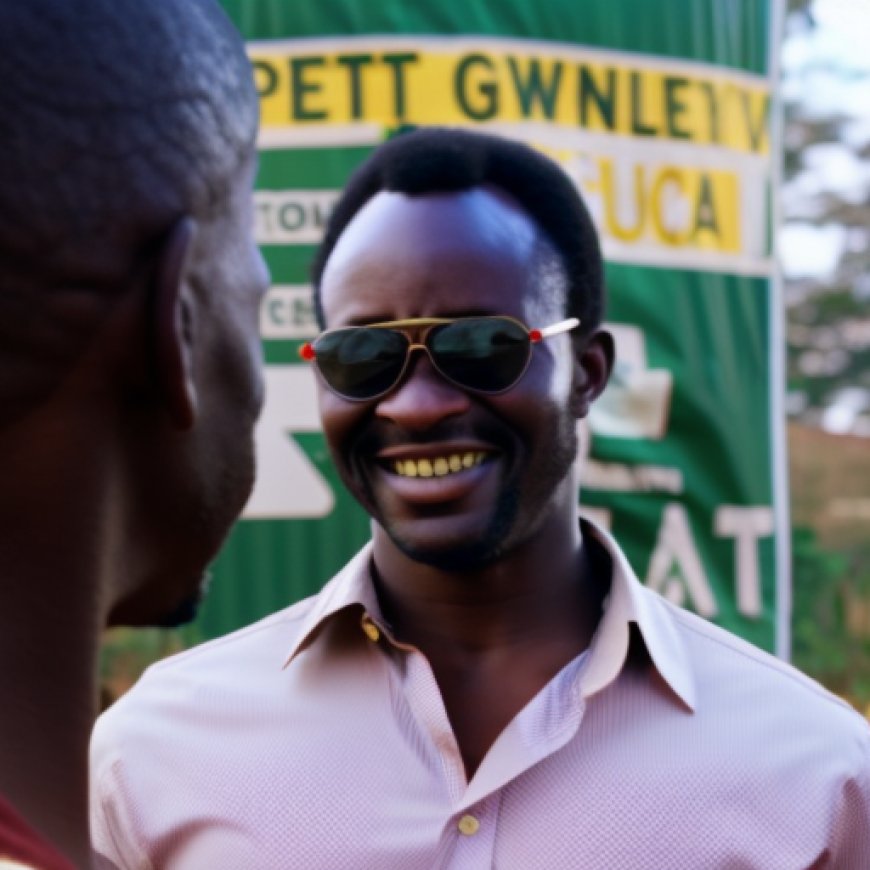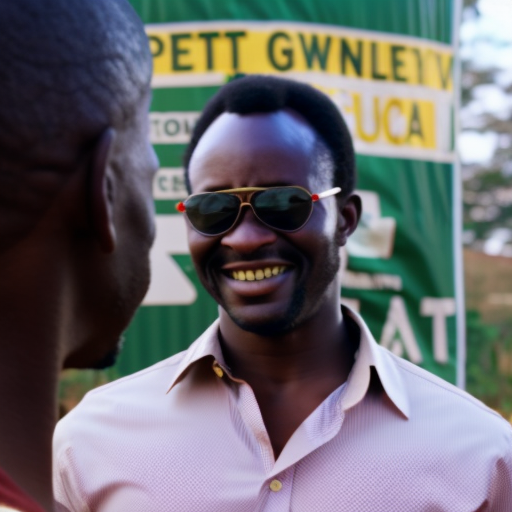Stephen Bikoko: the visionary peer educator behind Upendo group’s youth empowerment drive in Tanzania
Stephen Bikoko: the visionary peer educator behind Upendo group's ... African Business


Mother-of-two Empowered Through Upendo Group
Mother-of-two Melania Zambiliti, 21, wanted something more for herself and her family. Living with her in-laws and working as an ad hoc cleaner at a local restaurant where she was given some food, she struggled to make ends meet.
When an opportunity presented itself, she welcomed this.
The ambitious and determined young woman joined the Upendo group, where she learned economic activities that put her future back on track. As a result, she is able to support her family financially and cater for their basic needs.
Through sheer hard work, she managed to save enough money to build her own home, a significant accomplishment that has brought her immense pride and joy. Her transformation from struggling mother to successful provider is a source of inspiration for her community.
“After joining the group, I have cultivated sunflower farms and successfully built this house,” she said.
But this is not the only area where she has been empowered.
“The group has helped me understand reproductive health. Now, I can plan how many children to have and when to have them,” she said.
By taking charge of her own fertility with the use of modern contraceptives, she can choose when and how many children to have, while ensuring she is able to provide financially for them.
Equipping young people with skills
Upendo was started by peer educator Stephen Bikoko, a young man who is passionate about equipping youth in his community with knowledge and skills that empower them.
His commitment to a positive impact on his community stems from training he received on sexual reproductive health, gender-based violence, and harmful practices, and entrepreneurship. This was provided by Kiota Women’s Health and Development (KIWOHEDE), supported by the Swiss Embassy and UNFPA, the United Nations sexual and reproductive health agency, through the Safeguarding Young People programme.
Armed with these new skills, Mr. Bikoko reached out to youth in Kakonko District to empower them.
“Since I acquired knowledge on gender-based violence, I succeeded in providing various [training sessions] in the community,” he said.
His engaging approach and passion captivated the attention of young people, especially those in informal groups such as motorcycle drivers known as Bodaboda. He soon earned their trust and became their advocate and mentor. He encouraged them to benefit from loans provided by the local council to youth, women, and people with disabilities.
Another of Mr. Bikoko’s notable accomplishments was the establishment of the Upendo group, for enthusiastic young people who want to improve their lives through education and entrepreneurial activities. Together, they have engaged in various economic pursuits, including poultry farming, goat keeping, and general farming.
Through their joint endeavors, the young members have not only acquired an income but also developed a strong sense of unity and purpose. Among them is Melania Zambiliti.
Championing sexual and reproductive rights
Mr. Bikoko’s efforts have not been limited to Upendo group. In his community, he also promotes sexual and reproductive health education, addresses gender-based violence and harmful practices, and champions the importance of HIV awareness. His articulate interaction with young people has caught the attention and support of community leaders, prompting them to allocate resources towards these crucial issues.
Mr. Bikoko’s peer education activities have had a profound impact on young people in Kakonko District. By arming 385 of them with in-depth knowledge of sexual and reproductive health, as well as prevention and response to gender-based violence, harmful practices, and HIV, he has empowered them to make informed decisions and live healthier lives. Of these, 167 were high school students, 97 bodaboda (motorcycle drivers), 52 from dispensaries, 54 from local markets, and 15 farmers.
The Upendo group has flourished, helping its members to discover their potential and contribute actively to their community’s growth and prosperity.
As for Mr. Bikoko, he is proud that he has made a lasting difference in the lives of the young people he serves.
The Safeguard Young People programme is being implemented in mainland Tanzania and Zanzibar, with a focus on regions with poor adolescent sexual and reproductive health indicators, including teenage pregnancy, HIV, child marriage, and gender inequality. The programme is co-funded by UNFPA and the Embassy of Switzerland in Tanzania.
Distributed by APO Group on behalf of UNFPA – East and Southern Africa.
SDGs, Targets, and Indicators
-
SDG 1: No Poverty
- Target 1.1: By 2030, eradicate extreme poverty for all people everywhere, currently measured as people living on less than $1.25 a day
- Indicator: The article discusses how Melania Zambiliti, a struggling mother, was able to improve her financial situation and support her family through economic activities.
-
SDG 3: Good Health and Well-being
- Target 3.7: By 2030, ensure universal access to sexual and reproductive health-care services, including for family planning, information, and education, and the integration of reproductive health into national strategies and programs
- Indicator: Melania Zambiliti mentions that she has learned about reproductive health through the Upendo group and can now plan how many children to have and when to have them.
-
SDG 4: Quality Education
- Target 4.4: By 2030, substantially increase the number of youth and adults who have relevant skills, including technical and vocational skills, for employment, decent jobs, and entrepreneurship
- Indicator: The article mentions that Stephen Bikoko, a peer educator, provides training sessions on various topics, including sexual reproductive health, gender-based violence, and entrepreneurship.
-
SDG 5: Gender Equality
- Target 5.2: Eliminate all forms of violence against all women and girls in the public and private spheres, including trafficking and sexual and other types of exploitation
- Indicator: Stephen Bikoko addresses gender-based violence and harmful practices in his community, as mentioned in the article.
-
SDG 8: Decent Work and Economic Growth
- Target 8.3: Promote development-oriented policies that support productive activities, decent job creation, entrepreneurship, creativity, and innovation
- Indicator: The article highlights how the Upendo group engages in various economic pursuits, such as poultry farming, goat keeping, and general farming.
-
SDG 10: Reduced Inequalities
- Target 10.2: By 2030, empower and promote the social, economic, and political inclusion of all, irrespective of age, sex, disability, race, ethnicity, origin, religion or economic or other status
- Indicator: Stephen Bikoko reaches out to youth in his community, including informal groups like motorcycle drivers, to empower them and encourage them to benefit from loans provided by the local council.
Table: SDGs, Targets, and Indicators
| SDGs | Targets | Indicators |
|---|---|---|
| SDG 1: No Poverty | Target 1.1: By 2030, eradicate extreme poverty for all people everywhere, currently measured as people living on less than $1.25 a day | The article discusses how Melania Zambiliti improved her financial situation and supported her family through economic activities. |
| SDG 3: Good Health and Well-being | Target 3.7: By 2030, ensure universal access to sexual and reproductive health-care services, including for family planning, information, and education, and the integration of reproductive health into national strategies and programs | Melania Zambiliti mentions that she learned about reproductive health through the Upendo group and can now plan how many children to have and when to have them. |
| SDG 4: Quality Education | Target 4.4: By 2030, substantially increase the number of youth and adults who have relevant skills, including technical and vocational skills, for employment, decent jobs, and entrepreneurship | The article mentions that Stephen Bikoko provides training sessions on various topics, including sexual reproductive health, gender-based violence, and entrepreneurship. |
| SDG 5: Gender Equality | Target 5.2: Eliminate all forms of violence against all women and girls in the public and private spheres, including trafficking and sexual and other types of exploitation | Stephen Bikoko addresses gender-based violence and harmful practices in his community. |
| SDG 8: Decent Work and Economic Growth | Target 8.3: Promote development-oriented policies that support productive activities, decent job creation, entrepreneurship, creativity, and innovation | The article highlights how the Upendo group engages in various economic pursuits, such as poultry farming, goat keeping, and general farming. |
| SDG 10: Reduced Inequalities | Target 10.2: By 2030, empower and promote the social, economic, and political inclusion of all, irrespective of age, sex, disability, race, ethnicity, origin, religion or economic or other status | Stephen Bikoko reaches out to youth in his community, including informal groups like motorcycle drivers, to empower them and encourage them to benefit from loans provided by the local council. |
Behold! This splendid article springs forth from the wellspring of knowledge, shaped by a wondrous proprietary AI technology that delved into a vast ocean of data, illuminating the path towards the Sustainable Development Goals. Remember that all rights are reserved by SDG Investors LLC, empowering us to champion progress together.
Source: african.business

Join us, as fellow seekers of change, on a transformative journey at https://sdgtalks.ai/welcome, where you can become a member and actively contribute to shaping a brighter future.







